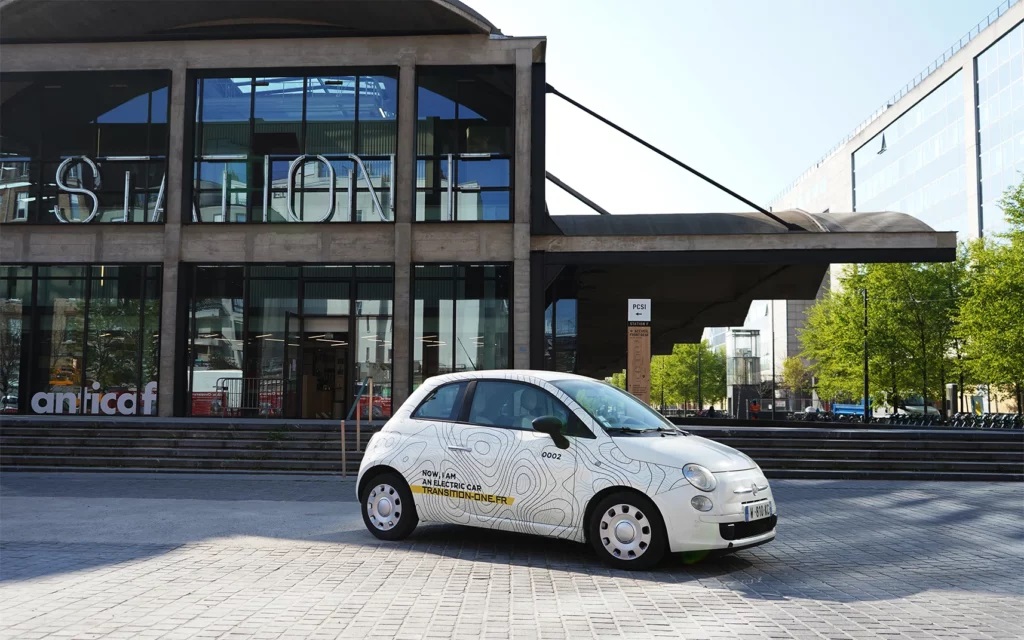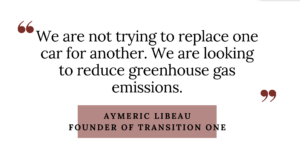In 2035, with some exceptions, only 100% electric new vehicles will be sold in Europe. The decision was approved recently by the 27 Member States of the European Union. This leaves 13 years for countries like Belgium to prepare.
This is not a long time for an undertaking of this scope. In addition, consumers will need to prepare for the extra cost of leaving their old petrol or diesel cars behind to switch to a new electric vehicle.
One possible solution is to retrofit existing vehicles: transforming a car with a traditional combustion engine into an electric car. It is possible, but still very expensive.
However, making this easier and cheaper for everyone is Aymeric Libeau's ambition. Four years ago, the French entrepreneur founded Transition One, a company whose objective is to allow everyone to retrofit their car, anywhere in Europe, for a total cost of €7,000 to €8,000 (without any premiums); a transformation that could be done in four hours at a franchise partner.
The work behind the craft
Libeau’s prototype is based on a Fiat 500, an old diesel car which he has been running as a retrofitted electric car for 11 years. It already has more than 14,000 km on the clock since its modification.

Aymeric Libeau, founder of Transition One, in front of his retrofitted car models. Credit: Electric Drive Africa / Twitter
The engine block has been replaced by an electric motor and batteries, the tank by the charging socket. The car takes five hours to fully charge from a domestic outlet, and half that time at a charging station. Finally, no additional space in the car has been sacrificed.
"To succeed in a retrofit, you only have to reuse the spaces you have freed up," Libeau said.
But if the car retains all its space, its autonomy, on the other hand, is limited to 100 km.
"It's not just an automotive subject, it's above all a subject of ecological transition: how we're going to do better tomorrow than what we did yesterday," he said.
In France, the practise of retrofitting has been allowed for two years. However, each modified model must be officially approved which can cost between €100,000 and €800,000, depending on the model. Currently, Libeau is working on getting five models approved: the Fiat 500, the Twingo, the Kangoo, the Renault Clio and the Mini.
He said they expect the first approved vehicles to be delivered in France at the end of 2023, while for Europe at large it all depends on the speed of the European Commission agreeing on retrofitting regulations.
"We are at the beginning of the era of retrofit and the era of retrofit will be unavoidable," he said. "It is essential because there are so many cars that if we want to replace them all, it will take at least 20 years."
An uphill battle
In Belgium, it will be necessary to wait for a legal framework before this is possible.
Yves Toussaint, a Belgian entrepreneur and founder of Courant Alternatif Engineering, knows this all too well. This automotive specialist retrofitted an old 1974 Ford Escort as part of a university start-up, but since then, the retrofit project has had to be put aside and the car still sits in the garage.
"Today, to be able to homologate a retrofitted car, first you have to have the agreement of the manufacturer, which is totally impossible; and then you have to pass a whole series of tests that are out of budget compared to back fitting," he said.
Related News
- 'Historic decision': EU to end sale of polluting cars from 2035
- First petrol station in Belgium transformed into electric charging hub
- Half of EU electric car charging stations concentrated in just two countries
On the other hand, in the Netherlands and Germany, approval works on an individual basis, with individuals bringing their retrofitted vehicles for approval. This system is also cheaper, costing a maximum of €2,000.
"For the moment, I still hope to reach a solution with the Belgian authorities," Toussaint said. "I prefer to have Belgian homologation. But if it does not get better, we will have to go through approval via the Netherlands."
Hope for the future
The Belgian Minister of Mobility, Georges Gilkinet said he has been working on this Belgian legal framework for a year and a half and makes the assurance that it will be ready for next year.
"We will be ready in the spring," he said. "We are in the process of finalisation, both with the Regions that are also competent and the sector. We can do it all the more easily in the spring with a few simple rules: have the fuel tank removed, keep the length, the mass, the weight, the power (except for vehicles with very small power); and we will have a simplified homologation process to allow the retrofit of cars."

Vice-prime minister and Mobility Minister Georges Gilkinet pictured during a plenary session of the Chamber at the Federal Parliament in Brussels. Credit: Hatim Kaghat / Belga
Gilkinet also said specialised garages would be approved to facilitate the inspection process of the cars. An estimated 500 garages could be approved.
In the meantime, retrofitting your car today costs between €9,000 and €50,000, depending on the model and range, not to mention the cost of homologation.


